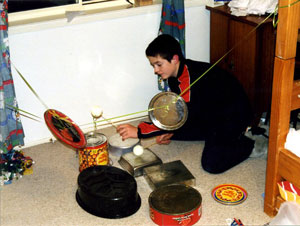Bedtime is often a problem in our house. Can you give me some strategies to help?
My children are very fussy eaters. I am worried that they will not get the required nutrition as they grow. Have you any suggestions
I have two difficult children to get ready for school before I leave for work. What suggestions can you give me for this chaotic time?
Bedtime is often a problem in our house. Can you give me some strategies to help?
 It’s important to remember that “bed time” is not always “sleep time”. Just as adults do not fall asleep at the exact time every night, so children have different sleep patterns as well.
It’s important to remember that “bed time” is not always “sleep time”. Just as adults do not fall asleep at the exact time every night, so children have different sleep patterns as well.
However, this does not mean that the ” Repetition, Routine and Rules ” principle does not apply. Have a discussion with the children; decide (with parental guidance!) what the appropriate time for bed is. This is the time that each child will retire to their room at night. They may read, listen to quiet music or play a quite game (like a jigsaw). This allows time for the child to “quieten down” and get ready to sleep. After an agreed time (usually 15 minutes to half an hour) the child goes to bed. A night-light will help a frightened child. A “friendly cuddly toy” may also be helpful. Quiet music may also calm the child.
This routine is drawn up on a chart with the children’s names and the time they will go to bed. The chart will act as a reminder and be a helpful tool when the child argues about bedtime. It is important for parents to be calm and keep reminding the child that this is the rule and must be kept.
Consequences need to be put in place for when the child refuses to obey the rule previously set. An example of this would be: “If you do not go to bed now, you will not be allowed any television tomorrow night”. If the consequence is set in place, again, write it down in a prominent place and make sure that tomorrow night, the child does not watch television.
Parenting is hard work. It requires patience, persistence and plenty of love.
Brenda Inglis-Powell
Co-Author of Raising Difficult Children
My children are very fussy eaters. I am worried that they will not get the required nutrition as they grow. Have you any suggestions?
 Many, many children find a change of diet stressful. Find a food they enjoy. For example, hamburgers made at home can be very nutritious. Add eggs, rolled oats, cheese or grated vegetables to the meat before cooking. If your child does not like eggs, don’t worry, serve pancakes. (The fact that there are four eggs in the pancakes will normally escape their attention). Be creative.
Many, many children find a change of diet stressful. Find a food they enjoy. For example, hamburgers made at home can be very nutritious. Add eggs, rolled oats, cheese or grated vegetables to the meat before cooking. If your child does not like eggs, don’t worry, serve pancakes. (The fact that there are four eggs in the pancakes will normally escape their attention). Be creative.
When shopping don’t buy any junk food or foods high in sugar or fat. Avoid soft drink – offer water instead – it is healthier. To serve a similar type of food every night is quite OK provided it is healthy. Serve small portions on a large plate. It looks smaller and will often entice a small eater to try. When cooking a meal, try and cook twice the amount needed, freeze the second portion for use on the night when there is just no time! Cut fruit into small pieces rather than hand a child a whole apple, banana or orange.
Take time to change your eating routine. Small changes will be easier to implement than large sweeping changes. Most of all avoid fast pre-processed food, which usually contains preservatives and fillers. Check the labels on everything you buy!
Parenting is hard work. It requires patience, persistence and plenty of love.
Brenda Inglis-Powell
Co-Author of Raising Difficult Children
I have two difficult children to get ready for school before I leave for work. What suggestions can you give me for this chaotic time?
 Preparation and timing are important when leaving home in the mornings. The key is to do as much as possible the night before. Are the bags packed with appropriate books? Are school uniforms ready to put on? Is ALL the uniform there (or is the hat missing, again!)?
Preparation and timing are important when leaving home in the mornings. The key is to do as much as possible the night before. Are the bags packed with appropriate books? Are school uniforms ready to put on? Is ALL the uniform there (or is the hat missing, again!)?
A prominent list of tasks to be achieved will provide a visual cue for both parent and child.
Any parents find that by keeping the television off in the mornings, their child is able to more easily focus on the task at hand. If your children watch television, then it only goes on when everyone is ready to leave, and not before. Wake the family so that there is enough time to complete all the tasks required.
A Hint: wake difficult children slowly and be prepared to go in twice with an encouraging remark to start the day. Remember transition times can be very stressful for some children. Prepare a check list for the exit door – Hat, Bag, Shoes, Lunch and encourage the children to check the list every day. By teaching children competence, you are preparing them for later life. Hopefully by the time they are 30 they can get to work on time because of your training.
Parenting is hard work. It requires patience, persistence and plenty of love.
Brenda Inglis-Powell
Co-Author of Raising Difficult Children